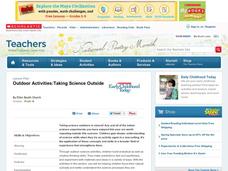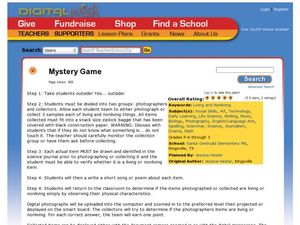Curated OER
Variable Skies
Students examine factors which affect a vortex and create model tornadoes. They identify variables, pose a testable question, and perform an experiment using the scientific method. After they collect their data, students write a complete...
Curated OER
Energy of the Future
Students examine technologies that already exist and record their findings in a journal. They work with students in other countries to explore alternative energy sources They publish their designs online.
Curated OER
Nutrition Track
Students examine the importance of a healthy diet based on the USDA food pyramid. They log their daily food intake in a journal. They create charts to analyze and compare their diets to the USDA recommended allowances.
Curated OER
A Moon with a View
Third graders explore the rotation of Earth and the moon. In this solar system lesson, 3rd graders participate in an Earth and moon simulation in which part of the class "becomes" the sun, while other children represent the moon by...
Curated OER
Paper Airplane Contest
Students research principles of flight. They design their own paper airplanes and make predictions about the performance of different designs. Students keep track of their findings in an electronic journal.
Curated OER
WET Science Lesson #3: Comparison of Aquatic and Terrestrial Plants
Elementary life science explorers compare and contrast aquatic and terrestrial plants (elodea and soybeans) in a Venn diagram. Some background information is provided to support direct instruction, and general instructions are provided...
Curated OER
Rock Sorting
First graders observe rocks, record their observations about the rocks and classify them according to their observations. As a class, 1st graders create a list of observable characteristics of rocks. They sort a group of rocks...
Curated OER
Animal Categories
Students sort animal picture cards into classification groups such as mammals, reptiles, amphibians, insects and fish. They discuss the characteristics that each group of animals shares then arrange the pictures into a clasificatioon...
Curated OER
Sorting
Students examine the concepts of organization and classification. In this library skills lesson, students practice ordering and sorting skills by playing an interactive Internet game. Students then practice their classification skills in...
Virginia Department of Education
Laboratory Safety and Skills
Avoiding lab safety rules will not give you super powers. The lesson opens with a demonstration of not following safety rules. Then, young chemists practice their lab safety while finding the mass of each item in a mixture and trying to...
Foundation for Water & Energy Education
What is the Water Cycle? Activity B
Curious physical scientists follow a lesson on the properties of water with this lesson on distillation. They observe a miniature water cycle model that filters dirty water into clean water. These two lessons combined are an enriching...
Scholastic
Discussion and Dissection of an Owl Pellet
Young scientists get the chance to dissect pellets "owl" by themselves to determine the owls environment and nourishment. This is the third part of a three-part series.
Virginia Department of Education
States of Matter
Scientists have been studying exothermic reactions before they were cool. The lesson begins with a discussion and a demonstration of heat curves. Scholars then determine the heat of fusion of ice and the heat needed to...
Virginia Department of Education
Molar Volume of a Gas
What is a chemist's favorite plant? Stoichiome Tree! Scholars produce hydrogen gas by reacting magnesium with hydrochloric acid. Then they calculate the molar volume of the gas produced before answering assessment questions.
Space Race
Sensory Detectives
Test your learners' sensory awareness with three hands-on activities that ask pupils to use their other senses to identify and describe everyday objects hidden from sight.
Virginia Department of Education
Historical Models of Atoms
What does the past have to do with today? Young scientists find that answer as they learn more about past chemists and their significant contributions to the field. Pupils use the Internet to research historical figures...
Polar Trec
Permafrost Thaw Depth and Ground Cover
The thaw depth of tundra creates a positive feedback loop with both global warming and the carbon cycle. Scholars sort photos and develop a hypothesis for ground cover and permafrost depth. Then they review the data and measurements...
Curated OER
Beauty in the Eye of the Scientist
Students research science's 10 most beautiful experiments and the historical periods in which these experiments were conducted. Then, students create magazine covers for issues of a fictional magazine.
Curated OER
Student Weather Journal
Students recognize different types of cloud patterns and associate these patterns with certain types of weather. They predict the weather for the next 6 to 24 hours. They then improve their observation skills as they check on the weather...
Curated OER
Sweat Your Socks Off
Fourth graders explore evaporation by conducting an experiment. In this water properties activity, 4th graders examine the differences between two socks that get wet, one which is placed in front of a fan. Students discuss...
Curated OER
The Art of Adaptation
Students examine and discuss animal adaptation. They read an article about snakes, conduct research on ways animals adapt, develop a diagram, and write a short story written from the perspective of the animal they researched.
Curated OER
Outdoor Activities: Taking Science Outside
Students participate in various outdoor science activities to enhance their observation, classification, and analysis skills. In this outdoor lesson, students begin by observing a tree from a straightforward angle, then from the...
Curated OER
Mystery Game
Students examine objects and determine if they are living or nonliving. In this scientific observation lesson, students collect living and nonliving items from outside, record a drawing of each in their journal, and write a short...
Curated OER
Moon Journal
Students review the planets and major moons in the Solar System. In groups, they research and describe the various phases of the moon. They record their observations of the moon phases over a specific period of time and use the...























